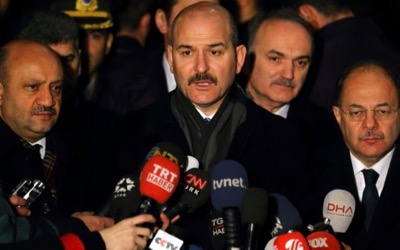
On 7 November, at a press conference with his Hungarian counterpart Viktor Orbán, Turkish President Recep Tayyip Erdoğan declared that his country would continue to receive migrants, but that without the financial aid of the European Union, he was going to "open the gates."
The European Union had pledged to give Turkey € 2 billion a year in exchange for hosting migrants while preventing them from crossing into the EU. The first disbursement was made in 2016, but it actually served to finance the war in Syria. There was no record of it on the official budget of the EU nor could anyone trace where the money came from. With the end of the war, the European Union has suspended payments.
The day after the President‘s declaration, Turkish Interior Minister Süleyman Soylu announced that Daesh terrorists of European origin held in Turkish prisons would be expelled as from Monday, 11 November 2019 (photo).
According to international law, Turkey has the right to return foreign prisoners to their country of origin by boat or on a regular flight. Once they set foot on their soil, the receiving States can no longer turn them away. However, European states can forestall this tight spot by verifying passports on board the plane and prohibiting certain people from getting off. In this case scenario, the transport companies are responsible for their passengers and must return them to the country of departure if it agrees to take them back.
There are approximately 1,200 European prisoners in Turkish prisons. At least 80,000 more jihadists (from Daesh, but mostly al-Qaeda) are awaiting their fate in the Syrian governorate of Idlib, under the protection of the Turkish army and fed by French and German "NGOs." If the European Union caves in to Turkey’s blackmail, it might inspire other actors involved in the war against Syria. Already, Kurdish PKK-YPG mercenaries are planning to make profitable use of their Daesh prisoners.
For the past four years, Turkey and countries of the European Union secretly supported Daesh in their common struggle against the Syrian Arab Republic. But now, at the end of the war, the heretofore allies are blaming each other and shifting responsibility for their involvement in shameful operations. Proof of this is the recent condemnation issued by the European Union against the military operation undertaken by Turkey in northeastern Syria to evict the armed groups of the PKK-YPG from the vicinity of the Turkish-Syrian border.



























Stay In Touch
Follow us on social networks
Subscribe to weekly newsletter